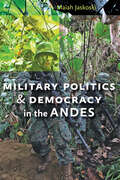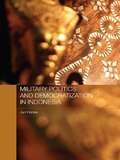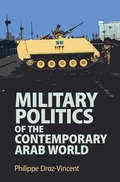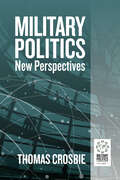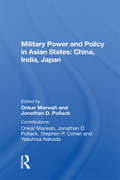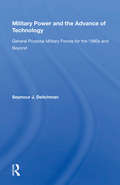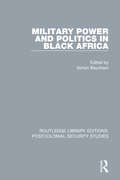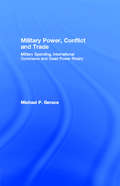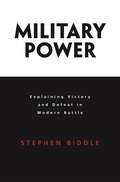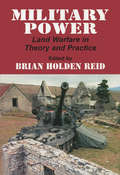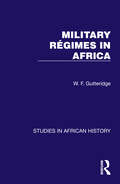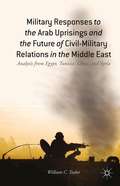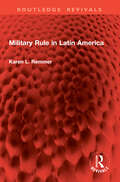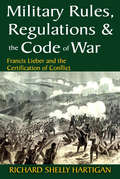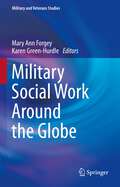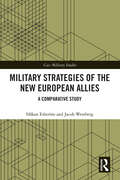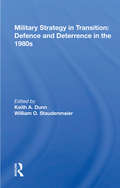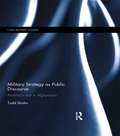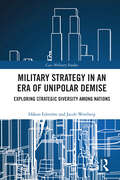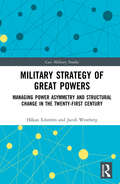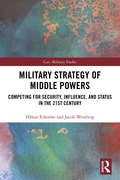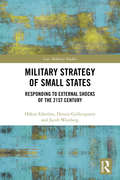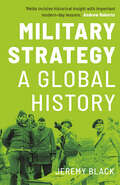- Table View
- List View
Military Politics and Democracy in the Andes
by Maiah JaskoskiInterviews with active-duty and retired military officers in Ecuador and Peru shed light on the evolution of Andean civil-military relations, with implications for democratization.Military Politics and Democracy in the Andes challenges conventional theories regarding military behavior in post-transition democracies. Through a deeply researched comparative analysis of the Ecuadorian and Peruvian armies, Maiah Jaskoski argues that militaries are concerned more with the predictability of their missions than with sovereignty objectives set by democratically elected leaders. Jaskoski gathers data from interviews with public officials, private sector representatives, journalists, and more than 160 Peruvian and Ecuadorian officers from all branches of the military. The results are surprising. Ecuador’s army, for example, fearing the uncertainty of border defense against insurgent encroachment in the north, neglected this duty, thereby sacrificing the state’s security goals, acting against government orders, and challenging democratic consolidation. Instead of defending the border, the army has opted to carry out policing functions within Ecuador, such as combating the drug trade. Additionally, by ignoring its duty to defend sovereignty, the army is available to contract out its policing services to paying, private companies that, relative to the public, benefit disproportionately from army security. Jaskoski also looks briefly at this theory's implications for military responsiveness to government orders in democratic Bolivia, Colombia, and Venezuela, and in newly formed democracies more broadly.
Military Politics and Democratization in Indonesia (Rethinking Southeast Asia)
by Jun HonnaThe military have had a key role to play in Indonesia's recent history and may well have a decisive role to play in her future. This book looks at the role of the military in the downfall of Suharto and their ongoing influence on the succeeding governments of B.J. Habibie and Abdurrahman Wahid. The author also examines such key features as human rights, reconciliation, civic-military discourse and ongoing security dilemmas. The book is unique in providing the best overview of the role of the military in the world's fourth most populous nation.
Military Politics of the Contemporary Arab World
by Philippe Droz-VincentAside from large-scale civic mobilisations, no force was more critical to the outcomes of the 2011 Arab uprisings than the armed forces. Nearly a decade after these events, we see militaries across the region in power, once again performing critical roles in state politics. Taking as a point of reference five case studies where uprisings took place in 2011, Tunisia, Egypt, Libya, Yemen and Syria, Philippe Droz-Vincent explores how these armies were able to install themselves for decades under enduring authoritarian regimes, how armies reacted to the 2011 Uprisings, and what role they played in the post-Uprising regime re-formations or collapses. Devoting a chapter to monarchical armies with a special focus on Saudi Arabia and the UAE, Droz-Vincent addresses whether monarchies radically differ from republics, to compare the foundational role of Arab armies in state building, in the Arab world and beyond.
Military Politics: New Perspectives (Military Politics #1)
by Thomas CrosbieBringing together new research by leading scholars, this volume rethinks the role played by militaries in politics. It introduces new theories of military politics, arguing against the inherited theories and practices of civil-military relations, and presents rich new data on senior officership and on the intersection of military politics and military operations. As the first volume in Berghahn Books’ Military Politics series, it provides a blueprint for a new research paradigm dedicated to tracing how militaries shape their political environments, focusing particularly on the core democratic questions raised by politically-effective (and ineffective) militaries.
Military Power And Policy In Asian States: China, India, Japan (Westview Special Studies On South And Southeast Asia)
by Onkar MarwahThis study challenges the belief that the security concerns and strategic objectives of lesser states are dependent on the dominant power alliances and on assessments by major powers of the prospects for peace or war. Focusing on the views of security and military power adopted by elites in China, India, and Japan, the contributors point out that e
Military Power And The Advance Of Technology: General Purpose Military Forces For The 1980s And Beyond
by Seymour J. DeitchmanThis book deals with the basic facts of the military-industrial complex, examining its institutional dynamics and constitutional barriers to change. It shows how simplistic journalistic prescriptions and trivial observations fail to do justice to the enormous complexity of an industrial economy.
Military Power and Politics in Black Africa
by Simon BaynhamFirst published in 1986, Military Power and Politics in Black Africa explores many themes that concerned military power and politics in sub-Saharan Africa at the time of publication. Adopting a thematic approach, the book considers the nature of both intervention and disengagement and looks at the relationship between civilian and military institutions. The final chapters put forward arguments for the importance of foreign intervention in the politics and civil-military relations of African states.
Military Power, Conflict and Trade: Military Spending, International Commerce and Great Power Rivalry
by Michael P. GeraceWherever international commerce flows in world politics, military power often flows with it - sometimes as a protector of commerce, sometimes as its promoters and sometimes as a tool of aggression against it. How are military power and international trade related? Do military power and commerce expand together or does military power decline as commerce (and perhaps interdependence) increases? Does this relationship vary across countries and, if so how? Power, Conflict and Trade is a study of the relationship between military power and international commerce among the Great Powers prior to World War I.After building an argument for a direct relationship between military power and commerce - one grounded in a mercantilist view of state power- and exploring their numerous connections, the book estimates models of the relationship among the Great Powers and explores a great deal of their commercial and military data, all of which is situated in the context of their mutual rivalries. Another question investigated is whether the peacetime conflicts and rivalries of the Great Powers affected their trade relations adversely. There is strong support for the argument that military power and commerce move together in world politics, though there is evidence for an inverse relationship as well.
Military Power: Explaining Victory and Defeat in Modern Battle
by Stephen BiddleIn war, do mass and materiel matter most? Will states with the largest, best equipped, information-technology-rich militaries invariably win? The prevailing answer today among both scholars and policymakers is yes. But this is to overlook force employment, or the doctrine and tactics by which materiel is actually used. In a landmark reconception of battle and war, this book provides a systematic account of how force employment interacts with materiel to produce real combat outcomes. Stephen Biddle argues that force employment is central to modern war, becoming increasingly important since 1900 as the key to surviving ever more lethal weaponry. Technological change produces opposite effects depending on how forces are employed; to focus only on materiel is thus to risk major error--with serious consequences for both policy and scholarship. In clear, fluent prose, Biddle provides a systematic account of force employment's role and shows how this account holds up under rigorous, multimethod testing. The results challenge a wide variety of standard views, from current expectations for a revolution in military affairs to mainstream scholarship in international relations and orthodox interpretations of modern military history. Military Power will have a resounding impact on both scholarship in the field and on policy debates over the future of warfare, the size of the military, and the makeup of the defense budget.
Military Power: Land Warfare in Theory and Practice
by Brian Holden ReidThe contributors here consider the multifarious aspects of the Anglo-American approach to war. All the contributors are concerned to base their work on the overall historical context. They explore the relationship between theory and practice in military operations.
Military Regimes in Africa
by W. F. GutteridgeOriginally published in 1975, this book examines the achievements of, and problems encountered by, African military regimes in office. It begins with 2 chapters discussing trends in the formation and organization of African armies and the influence on these armies of the colonial legacy. The author then studies 6 case histories in detail. His findings show that, though there are certain typical commonalities, each regime has its own particular characteristics. This will be of interest to students of African, military and colonial studies.
Military Responses to the Arab Uprisings and the Future of Civil-Military Relations in the Middle East
by William C. TaylorThis book explains Arab military responses to the social uprisings which began in 2011. Through a comparative case study analysis of Egyptian, Tunisian, Libyan, and Syrian militaries, it explains why militaries fractured, supported the regime in power, or removed their presidents.
Military Retirees: An Analysis Of Their Settlement In Foreign Lands With Emphasis On Central America And Mexico
by Phillip AllmanPast severe winters experienced in the United States, combined with escalated fuel prices and other unattractive conditions such as higher taxes, inflation, crime, urban decay, etc., have forced numerous American retirees south to more climatically favorable and economically amenable areas. Many have ventured into foreign lands in search of these amenities and some have established retirement residency in the nations south of our international border. Among these adventurous retiree migrants are significant numbers of American military retirees who have histories of extensive foreign travel and residence during their military careers. This book is about that migrant group and its settlement in Central America and parts of Mexico. It examines the places where these migrants have settled, determines why they have chosen those specific places for retirement, describes their characteristics, explains how the migration takes place, and discusses its consequences. Also, it provides a brief history of United States military personnel in foreign areas, with emphasis on the relationship between their frequent relocation and their propensity to migrate after retirement, and describes the world distribution of the 1.2 million members that comprise the military retiree population.
Military Rule in Latin America (Routledge Revivals)
by Karen RemmerFirst published in 1989, in Military Rule in Latin America Karen L. Remmer draws upon a wide variety of sources, including interviews with top government officials, to challenge prevailing interpretations of military rule. She questions the assumption that military regimes can be adequately understood in terms of their origins and shows how important variations among them reflect the roles of state actors and institutions.In the first part of the book, Remmer provides a broad overview of military rule in Latin America; in the second, a detailed case study of Chile under the Pinochet regime. She concludes by examining the implications of her findings for understanding transitions from authoritarianism and the consolidation of democracy. This groundbreaking work is essential reading for scholars and researchers of Latin American studies, political studies and comparative politics.
Military Rules, Regulations and the Code of War: Francis Lieber and the Certification of Conflict
by Richard Shelly HartiganMilitary commanders from ancient time had set down rules and regulations to discipline their troops. From the Pharaohs on, commanders directed the strategy, tactics, and camp discipline of the often unruly hosts of soldiers under their command. They had one aim: to create an efficient fighting force. Military officers, camp-followers and cooks were all expected to perform their services according to mandate and in light of the best interests of the armed force and the fighting soldiery. Modern commanders have exemplified the same passion for military discipline to produce an effective combat machine. Military analyses derived from Roman law contained enough historical examples to fill an encyclopedia. Yet, although addressed to the problems of their day, they generally remained the private counsel of scholars and had little impact on political and military decisions. While theorists of international law were developing a body of rules to govern warfare, practitioners of conflict were largely moved by the motives of military necessity. Under the dual auspices of military necessity and national self-interest, the code of the military commander was simple: maintain a disciplined fighting force in order to achieve military victory. To remedy this gap between theory and practice, a practical guide was needed which would briefly describe for commanders in the field their rights and obligations of belligerents as custom and theory had developed them. Then political and military policy could be expected to conform to the theoretical law of nations. This was the synthesis that the Lieber code proposed. Originally published in as Lieber's Law and the Code of War, this paperback edition bears a new title that more precisely identifies the subjects covered.
Military Social Work Around the Globe (Military and Veterans Studies)
by Mary Ann Forgey Karen Green-HurdleThis is the first book to focus on the scope of social work practice within military settings from an international perspective, and therefore addresses what has been a significant gap in the literature. Given the critical support needs of military personnel and their families worldwide, and the expanding role of social work in responding to these needs, this book offers a comprehensive global understanding of the common military social work (MilSW) practices with active duty military service members and their families, as well as the forms of practice and approaches that are unique, or potentially transferable across nations.Based on a systematic inquiry conducted by the Editors, there are at least 25 countries that have social workers working directly within their country’s military in either a civilian or uniformed capacity, or both. This book includes contributions from experts in Australia, Canada, Denmark, Finland, Ireland, Israel, the Netherlands, New Zealand, South Africa, the UK, and the USA, who describe various aspects of the MilSW role within their country and the research that informs what military social workers do. The MilSW similarities and differences among these countries are highlighted, including developmental milestones, practice settings, practice orientation and approach, ethical dilemmas, military to veteran transition support, and past and current challenges. Experts from countries that do not yet have MilSW but are interested in developing it (Japan, Ukraine) or are in the process of establishing this area of practice (Slovakia), also contribute chapters about these developments and the evidence base that supports this direction.Military Social Work Around the Globe is a valuable resource for social work programs and essential reading for instructors and students in MilSW electives and specializations. It is also pertinent reading for occupational social work and international social work courses. In addition, this book is an important source of information for military social workers who would like to gain insights into existing programs and the possibilities for international collaboration, and for countries interested in developing MilSW.
Military Sociology: A Guided Introduction (Sage Library Of Military And Strategic Studies)
by Wilbur J. Scott Karin Modesto De Angelis David R. SegalThis textbook introduces the reader to the field of military sociology through narrative reviews of selected key studies in the discipline. The book provides a guided introduction. In each chapter, the authors set the stage and then immerse the reader in Spotlights – that is, descriptions of essential studies that inform the discipline of military sociology. The goal is to afford readers a ready pathway into how sociologists and social scientists have thought about topics in the study of the military and war. Topics covered in the book include: What is military sociology? What does it have to offer in understanding armed forces, wars, and societies? What basic tools are needed to ply sociological, or more broadly, social science perspectives for studying war and the military? What are the bio-social bases of war? What does the spectrum of such societally organized violence look like? How do societies raise and maintain formal militaries? What are variations in their social composition and in the profiles of civil–military relations? How and why is military organization and war changing so dramatically in the 21st-century? What does the future hold? This book will be of great interest to students of military sociology, the armed forces and society, peace studies, and international relations.
Military Strategies of the New European Allies: A Comparative Study (Cass Military Studies)
by Håkan Edström Jacob WestbergThis book analyses how and to what extent ex-communist states have adjusted their defence strategies since joining the EU and NATO, and how differences and similarities between their strategies can be explained. Between 1999 and 2013, four phases of enlargement took place when the European Union (EU) and NATO allowed 11 new former communist states to enter both organisations. These states share some common attributes and experiences related to strategic culture and common experiences during the Cold War era that can potentially explain similarities in behaviour and preferences among them. However, the strategic adjustments among these states are far from uniform. In an effort to explain these differences, the book introduces three intervening variables: (1) differences in relative power and position in the international system, (2) national geographical characteristics; and (3) historical experiences related to formative periods of state-building processes as well as wars and armed conflicts. Empirically, the book strives to present and analyse the defence strategies of each of the new allies by conducting a structured focused comparison of official strategic documents from the twenty-first century for each of the 11 cases. Theoretically and methodologically, it introduces an analytical framework enabling us to explain both similarities and differences in the formulation of the strategies of the 11 states, and to shed light on their external and internal efforts to promote their strategic interest by operationalising the dependent variable - defence strategy. The analytical framework combines elements of structural realism with classical realism, and constructivist research on unit-level characteristics related to relative power and perceptions of strategic exposure. This book will be of much interest to students of strategic studies, European Union policy, NATO and International Relations in general.
Military Strategy In Transition: Defense And Deterrence In The 1980s
by Keith A. Dunn William O. StaudenmaierCurrent NATO military strategy is based on the policy of flexible response that U.S. and European politicians endorsed in 1967; for over 15 years, no fundamental changes in NATO's defense strategy have occurred. If NATO cannot stop a Warsaw Pact aggression conventionally, it continues to threaten a gradual and controlled nuclear escalation of both theater and strategic nuclear weapons. Many analysts now question the fundamental principles underlying NATO's policy and strategy, given the enormous changes that have occurred in the strategic environment between 1967 and 1984. The contributors to this book examine the recent proposal by Samuel Huntington, who advocates that NATO adopt a conventional counter-retaliatory strategy based on offensive military actions deep into Eastern Europe. In evaluating this new proposal, the authors analyze the potential impact that it would have on U.S. and NATO military doctrine, assess probable European and Soviet reactions to NATO adopting a conventional counter-retaliatory strategy, and address the linkages existing between conventional and nuclear strategy. In the final chapter, the editors consider the policy, strategy, and force structure questions raised in the book and recommend policy options for the United States.
Military Strategy as Public Discourse: America's war in Afghanistan (Cass Military Studies)
by Tadd SholtisThis book presents the current history of United States military strategy in Afghanistan as an example of dysfunctional policy discourse among the nation’s elites. The legitimacy of a country’s military strategy can become a subject of intense public debate and doubt, especially in prolonged conflicts. Arguments typically hinge on disagreements about the values at stake, the consequences of action or inaction, and the authority of those responsible for the plan. As the US entered its second decade at war in Afghanistan, political and military leaders struggled to explain the ends and means of their strategy through internal policy debates, the promotion of counterinsurgency doctrine, and day-to-day accounts of the war’s progress. Military Strategy as Public Discourse considers recent US strategy in Afghanistan as a form of valid and equitable public discussion among those with the ability to affect outcomes. The work examines the dominant forms of discourse used by the various groups of elites who make and execute strategy, and considers how representations of these forms of discourse in news media shapes elite understanding of the purpose of US efforts in wars of choice. The book proposes how policy-makers should address the problems of public discourse on war, which tends to exclude or marginalize relevant elites and focus on narrow questions of validity. This book will be of much interest to students of strategic studies, US foreign policy, and security studies in general.
Military Strategy in an Era of Unipolar Demise: Exploring Strategic Diversity among Nations (Cass Military Studies)
by Håkan Edström Jacob WestbergThis book presents a systematic comparison of the military strategies pursued by five great powers, eight major middle powers and eight middle powers during the early twenty-first century.In addition to mapping the strategic priorities of these states, the study develops and applies a theoretical framework to explain differences and similarities in their strategic priorities. Moreover, the work evaluates how the stability of the present international system, and the US-led liberal international order (LIO), is affected by the strategies pursued by the US and other leading states. The book aims to contribute to previous research in three ways. First, it intervenes in the debate on the stability of the unipolar system and the US-led international order by offering a theoretical framework and an empirical approach for exploring and explaining the strategic priorities and defence strategies of different categories of states. Second, it aims to fill a void in research on strategy – the lack of a comparative and systematic approach to contemporary strategy that facilitates and guides systematic comparisons and analyses of the alignment and military strategies pursued by both major powers and less powerful states. Third, it provides an empirical contribution to the debate on the stability of the unipolar system and the US-led international order by presenting a documentation of the strategic priorities of 21 states based on primary sources, consisting of official documents such as national security and defence strategies and defence bills. In the conclusion, the authors summarise the empirical findings on the system level, the regional level and the unit level and present their overarching conclusions for the whole project.This book will be of much interest to students of military and strategic studies, defence studies, foreign policy and international relations in general.
Military Strategy of Great Powers: Managing Power Asymmetry and Structural Change in the 21st Century (Cass Military Studies)
by Håkan Edström Jacob WestbergThis book explores the military strategies of the five system-determining great powers during the twenty-first century. The book’s point of departure is that analyses of countries’ defence strategies should acknowledge that states come in various shapes and sizes and that their strategic choices are affected by their perceptions of their position in the international system and by power asymmetries between more and less resourceful states. This creates a diversity in strategies that is often overlooked in theoretically oriented analyses. The book examines how five major powers – the United States, China, the United Kingdom, France and Russia – have adjusted their strategies to improve or maintain their relative position and to manage power asymmetries during the twenty-first century. It also develops and applies an analytical framework for exploring and categorising the strategies pursued by the five major powers which combines elements of structural realism with research on power transition theory and status competition. The concluding chapter addresses questions related to stability and change in the present international system. This book will be of interest to students of strategic studies, foreign policy, and International Relations.
Military Strategy of Middle Powers: Competing for Security, Influence, and Status in the 21st Century (Cass Military Studies)
by Håkan Edström Jacob WestbergMilitary Strategy of Middle Powers explores to what degree twenty-first-century middle powers adjust their military strategies due to changes in the international order, such as the decline in US power. The overarching objective of the book is to explain continuity and change in the strategies of a group of middle powers during the twenty-first century. These strategies are described, compared, and explained through the lens of Realism. In order to find potential explanations for change or continuity within the cases, as well as for similarities and differences between the cases, the strategies of 11 ‘middle’ powers are analysed (Canada, Germany, Italy, Spain, Australia, Brazil, Indonesia, South Africa, India, Japan, and South Korea). This group of countries are considered similar in several important aspects, primarily regarding relative power capacity. When searching for potential explanations for different strategic behaviours among the middle powers, their unique regional characteristics are a key focus and, consequently, the impact of the structure and polarity, as well as the patterns of amity and enmity, of the regional context are analysed. The empirical investigation is focused on security strategies used since the terrorist attacks 9/11 2001, which was one of the first major challenges to US hegemony. This book will be of much interest to students of military and strategic studies, foreign policy, and International Relations in general.
Military Strategy of Small States: Responding to External Shocks of the 21st Century (Cass Military Studies)
by Håkan Edström Dennis Gyllensporre Jacob WestbergThe book explores how small states adjust their military strategies in response to external shocks. Using primary sources from four Nordic countries, (Denmark, Finland, Norway, and Sweden), this volume explores how small states have adjusted their military strategies in response to external shocks of the 21st century. The 9/11 terrorist attacks, the Russian interventions in Georgia and Ukraine, and the rise of the Islamic State have all forced the Nordic states to adopt new strategies. While the responses have not been uniform, their differing relations to the EU and NATO have not prevented these countries from behaving similarly in military affairs. Limitations in military capacity has led all four countries to pursue strategies that include cooperation with more resourceful partners. It is necessary for them to cooperate with others to protect and promote their national interests. Moreover, the Nordic cosmopolitan outlook expresses milieu-shaping ambitions that we generally would not expect small states to pursue against a potential great power aggressor. This book will be of much interest to students of military strategy, defense studies, security studies, and international relations.
Military Strategy: A Global History
by Jeremy BlackA global account of military strategy, which examines the practices, rather than the theories, of the most significant military figures of the past 400 years Strategy has existed as long as there has been organised conflict. In this new account, Jeremy Black explores the ever-changing relationship between purpose, force, implementation and effectiveness in military strategy and its dramatic impact on the development of the global power system. Taking a &‘total&’ view of strategy, Black looks at leading powers — notably the United States, China, Britain and Russia — in the wider context of their competition and their domestic and international strengths. Ranging from France&’s Ancien Regime and Britain&’s empire building to present day conflicts in the Middle East, Black devotes particular attention to the strategic practice and decisions of the Kangxi Emperor, Clausewitz, Napoleon and Hitler.
